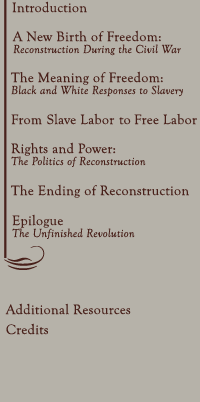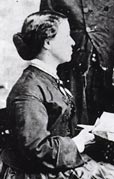








Biographical Sidebar: Laura M. Towne
 |
Laura
M. Towne (1825-1901), who devoted nearly forty years to educating
the freedpeople, epitomized the spirit of New England reform after
the Civil War. In April 1862, under the auspices of the Port Royal Relief Committee of Philadelphia, Towne set out for the South Carolina Sea Islands, where nearly 10,000 slaves were now within Union lines. |
Like others involved in the Port Royal Experiment, she hoped to make the islands a showcase for freedom by demonstrating blacks' capacity for education and productive free labor. Towne shared the paternalistic attitudes toward blacks typical of the time, but she genuinely wanted to assist in the transition from slavery to freedom.
| In September 1862, Towne and her friend Ellen Murray established Penn School on St. Helena Island. The school offered a traditional New England curriculum of arithmetic, reading and writing, geography, and classical languages. |  |
Towne,
who never married, volunteered her services and supported the school
with contributions from Northern supporters.
While many
Northerners returned home after the end of Reconstruction, Towne remained,
operating the Penn School until her death. It continued in operation
until the 1960s, and survives today as a community center.
For more
information about the school, see the Penn
Center website.